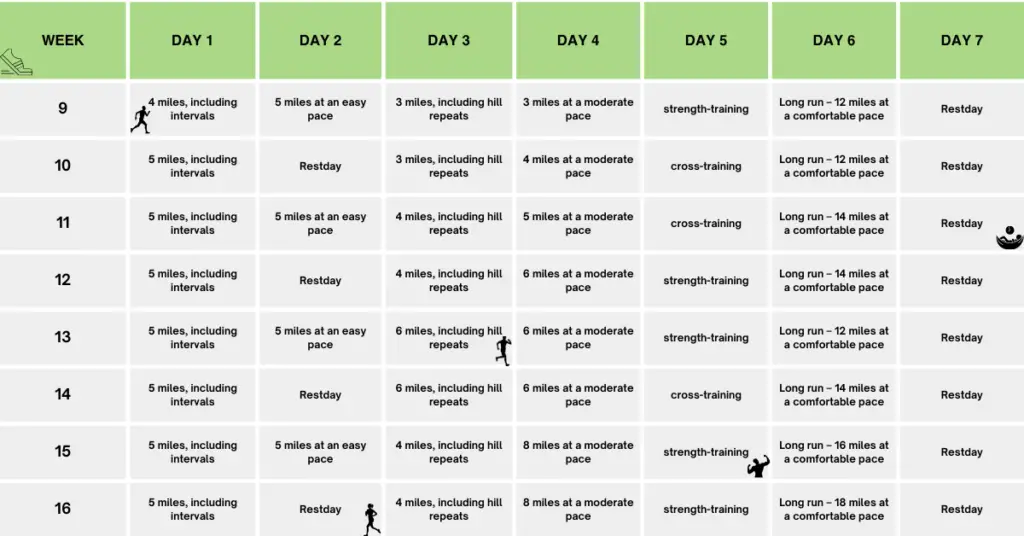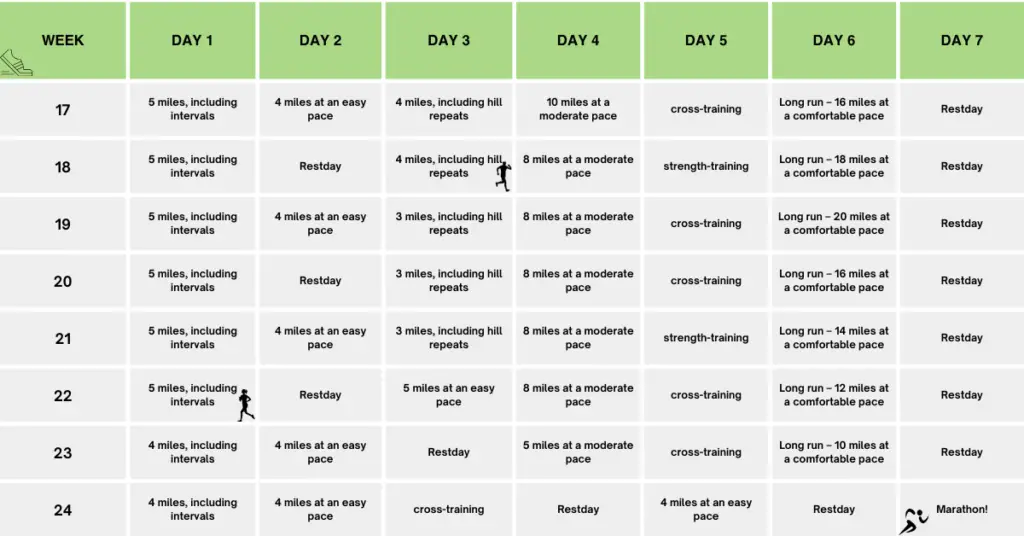Are you ready to take on the challenge of running a marathon? If so, you’re in the right place! Our 24 week marathon training plan is perfect for beginners who have never run a marathon before and experienced runners who want to improve their time and performance.
For the next 24 weeks, we will support you with your goal of running a marathon. Look forward to an unforgettable time and welcome to the runfitjourney!
Pro´s:
- ✅ Incredible comfort
- ✅ Superior grip
- ✅ Breathable
Con:
- ❌ Tongue is not fixed
24 Week Marathon Training: Let The Journey Begin!
Are you ready to take on the challenge of running a marathon? It’s an incredible accomplishment that requires dedication, hard work, and a solid training plan. If you have 24 weeks to prepare, you have plenty of time to build up your endurance and get ready for race day.
With our example training plan you can get started straight away. It depends on you!
Here is the first part of our 24 week marathon training plan

And here is the second part of our 24 week marathon training plan

Last but not least the third part of our 24 week marathon training plan

Week 1-6: Base Building
Welcome to the first six weeks of our 24 week marathon training plan! This is where we lay the foundation for the rest of our training. The goal of this phase is to build a strong base of endurance that will prepare us for the more intense training that comes later.
Weekly Mileage
During this phase, we gradually increase our weekly mileage. It’s important to be patient and not push ourselves too hard too soon. We want to avoid injury and burnout, so we start with a conservative increase in mileage each week.
Rest Days
Rest days are just as important as our running days. They give our bodies time to recover and prevent injury. During the first six weeks, we have one or two rest days per week, depending on our personal preference and fitness level.
Cross Training
Cross training is a great way to build endurance and strength without putting too much stress on our bodies. During the base building phase, we incorporate cross training into our routine once or twice a week. This can include activities such as cycling, swimming, or yoga.
By the end of these six weeks, we will have built a solid foundation of endurance that will prepare us for the more intense training to come. Remember to take it slow and steady, and trust the process. We’ve got this!
Week 7-12: Increasing Endurance

Next step on our 24 week marathon training plan! By now, we hope you’re feeling more confident and energized than ever before. The next few weeks are all about increasing your endurance and building up your stamina for the long haul.
Long Runs
Long runs are a critical part of any marathon training plan. During weeks 7-12, we’ll be gradually increasing the distance of our long runs to help build up our endurance.
Remember, the key to successful long runs is to take them slow and steady. Don’t worry about your pace or finishing time; instead, focus on building up your endurance and getting comfortable with longer distances.
Speed Work
While long runs are great for building endurance, speed work is essential for improving your overall running performance. During weeks 7-12, we’ll be incorporating speed work into our training plan to help increase our speed and efficiency. Here are a few examples of the types of speed work you might do:
- Interval Runs: These runs involve alternating periods of fast and slow running.
- Tempo Runs: These runs involve running at a steady, challenging pace for an extended period of time.
- Hill Repeats: These involve running up and down hills at a challenging pace.
Week 13-18: Peak Phase
Welcome to the Peak Phase of our 24 week marathon training plan! It’s important to remember that this phase is all about pushing ourselves to our limits. Let’s take a closer look at what this phase entails.
Tempo Runs
During this phase, tempo runs become a key component of our training. Tempo runs are runs where we run at a steady, challenging pace for an extended period of time. These runs help us build endurance and improve our lactate threshold, which is the point where our muscles start to produce lactic acid.
Strength Training

In addition to our running workouts, strength training becomes even more important during the Peak Phase. We’ll be focusing on exercises that target our lower body, such as squats, lunges, and calf raises. These exercises help improve our running form and prevent injury.
We’ll also be incorporating core exercises into our routine, such as planks and Russian twists. A strong core helps us maintain proper form while running and improves our overall stability.
Week 19-24: Tapering and Race Day
As we approach the final weeks of our 24 week marathon training plan, it’s important to focus on tapering and race day strategy. Tapering is the process of gradually decreasing our training so that we reach the starting line fresh and at our peak. It’s an essential part of every marathon training plan, but it’s also one of the hardest.
Reducing Mileage
It’s important to note that we should not stop running altogether as this can lead to a loss of fitness and a negative impact on our performance on race day. Instead, we should aim to reduce our mileage gradually over the final three weeks of our training plan.
Nutrition and Hydration
Proper nutrition and hydration are critical to our performance on race day. In the final weeks of our training plan, we should focus on consuming a balanced diet that includes plenty of carbohydrates, protein, and healthy fats. We should also pay close attention to our hydration levels and make sure we are drinking enough water throughout the day.
Race Day Strategy

Having a race day strategy is essential to our success in completing the marathon. We should familiarize ourselves with the course map and elevation profile and plan our pacing accordingly.
It’s important to start the race at a comfortable pace and gradually increase our speed as we progress through the course. We should also plan for any potential obstacles such as weather conditions and make adjustments to our strategy as needed.
Post-Marathon Recovery
Congratulations! You’ve just completed a marathon! This is an incredible achievement, and you should be proud of yourself. Now, it’s time to focus on recovery. Post-marathon recovery is essential to ensure that you heal properly and prevent injuries from occurring. In this section, we’ll discuss two main types of recovery: active recovery and rest and rebuild.
Active Recovery
Active recovery is a type of recovery that involves low-intensity exercise to help your body recover from the marathon. Active recovery can include activities such as walking, cycling, or swimming. These activities help to increase blood flow to your muscles, which can help to reduce soreness and stiffness.
It’s important to note that active recovery should be low-intensity. You don’t want to do anything that will put too much strain on your body. Instead, focus on gentle movements that will help you to loosen up and feel better.
Rest and Rebuild
Rest and rebuild is another type of recovery that involves taking time off from exercise to allow your body to heal. Rest is essential to allow your muscles to recover from the marathon. During this time, your body will repair any damage that may have occurred during the race.
It’s important to note that rest doesn’t mean that you should be completely inactive. You can still do light activities such as stretching or yoga to help your body recover.
Which Training Plan is best for me?

If you’re planning to run a marathon, choosing the right training plan is crucial. You want to make sure you’re giving yourself enough time to prepare, but you also don’t want to overdo it and risk injury. There are a few different training plans to choose from, so let’s take a look at which one might be best for you.
12 week marathon training plan
If you’re short on time, a 12 week marathon training plan might be the best option for you. This plan is designed for runners who already have a solid base of fitness and are able to handle higher mileage weeks. It’s important to note that this plan is not recommended for beginners or those who have never run a marathon before.
16 week marathon training plan
The 16 week marathon training plan is a good option for runners who are looking for a bit more time to prepare. This plan allows for a gradual increase in mileage and includes a mix of speed work, tempo runs, and long runs. It’s a good choice for intermediate runners who are looking to improve their marathon time.
24 week marathon training plan
The 24 week marathon training plan is the most popular option among runners. This plan allows for a slow and steady increase in mileage, which helps to prevent injury and burnout. It includes a mix of easy runs, long runs, and speed work, and is suitable for runners of all levels.
52 week marathon training schedule
If you’re looking for a long-term training plan, the 52 week marathon training schedule might be the best option for you. This plan is designed for runners who want to build a strong base of fitness before starting their marathon training. It includes a mix of easy runs, cross-training, and is suitable for runners of all levels.
Our Option on the 24 Week Marathon Training Plan
If you now want to run a marathon, I can completely understand that. It is a beautiful destination and you will have an unforgettable time. It’s never been so easy. All you need is your shoes and you can get started with our 24 week marathon training plan. It is only up to you!
With 24 weeks to train, you have enough time to gradually build up your mileage and focus on different aspects of your training. For the first 8 weeks, you can focus on building mainly aerobic mileage to improve your endurance. Then, you can start incorporating speed work and hill training to improve your overall fitness and running economy.
It’s important to note that the 24 week marathon training plan is not a one-size-fits-all solution. Every runner is different, and you should customize your training plan to fit your specific needs and goals.
One benefit of the 24 week marathon training plan is that it allows for a gradual increase in mileage, which can help prevent injury. It also allows for enough time to recover from any setbacks or injuries that may occur during your training.
With our 24 marathon training plan you too can run your first marathon or get back on track to success after a break.
We have enough time. You will do it and be the next marathoner!
We are convinced of our 24 week marathon training plan and hope you are too. Please let us know in the comments!







